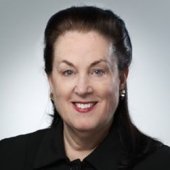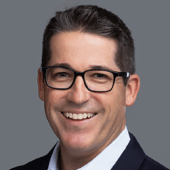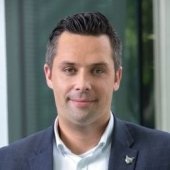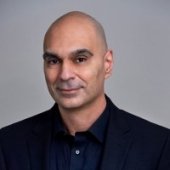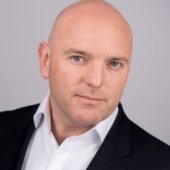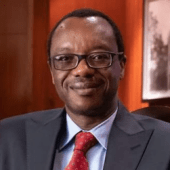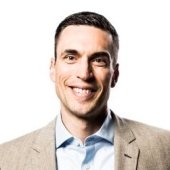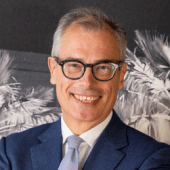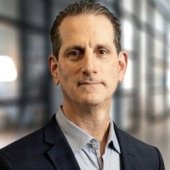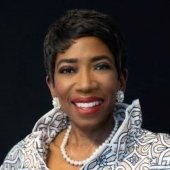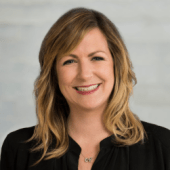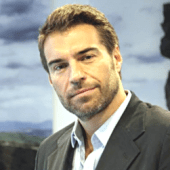Chair of Absa Group: For workers, offices and operations, flexibility is key to future success
IN BRIEF
- I see a very specific focus on cyber defenses going forward, and a decade from now it will be a much bigger part of every firm.
- I think the HR center is going to be much more highly skilled, much more a guide for mental wellness and stress assessment and management than it is today.
- To attract and retain younger workers today and in 2030, the C-suite and board must be more focused on sustainability and how their company impacts the planet.
Wendy Lucas-Bull is the Chairman of Absa Group Limited, Absa Bank Limited and Absa Financial Services Limited, based in Johannesburg, South Africa, positions she has held since April 2013. She is also Chairman of Shoprite Holdings, which is a position she has held since November 2020. Lucas-Bull has over 35 years of senior executive experience in the financial services industry. She sat down with Joe Kornik, Editor-in-Chief of VISION by Protiviti, to discuss the future of workers, offices and operations.
Kornik: Even though I wish we didn’t have to talk about it, I think we still have to start with the pandemic, which had a big impact on the way we work. What do you think will be its legacy when it comes to the future of work?
Lucas-Bull: I think it'll be different for different people and industries. Just to give you some perspective, I chair Absa Group, which offers business and investment banking, but I also chair Shoprite Holdings, which is the largest supermarket retailer in Africa. If you're looking at the world of work for each, those two businesses are very different and had very different roles during the pandemic. And each reacted in unique ways, but I would say the key takeaway from organization leaders is the need to be flexible. Let’s consider the knowledge worker and this idea that everyone can just work from home. Well, they can’t. Each employee has their own set of circumstances that must be considered. So, we’re starting to see more local office setups. There’s a real movement underway, in Africa at least, for companies to have two or three smaller offices closer to where people live rather than having one large head office. One, it provides a productive place to work if your home is not conducive. Two, smaller spaces with fewer people are considered safer following a global pandemic. And three, commuting becomes much easier in that set up. So, the pandemic has meant that employers must be much more thoughtful, much more flexible, about their business operations and the ways their employees can be most successful.
Kornik: Technology has been so crucial to working through the pandemic and will be more important in the future. How will technology continue to influence the future of work?
Lucas-Bull: The more technological points of entry you have in your organization, the greater the risk for a cyber attack. So, cyber defenses have had to try and keep pace, and in a lot of cases we've seen they haven't. And it’s most likely going to get worse in the future, and we're already seeing a shortage of trained individuals in that space. They're already at a premium, and they will continue to be because the more open systems we use for work, the more vulnerable we are. So, I see a very specific focus on cyber defenses going forward, and a decade from now it will be a much bigger part of every firm. As far as collaboration technology tools and workers, like I said about offices, I think the C-suite and boards are going to have to be a lot more thoughtful about the entire workforce. It's going to require more technical tools to be able to reach people working remotely and create those team and collaboration environments that would be happening more naturally in an office.
Kornik: Would you say that's one of the bigger challenges for the C-suite over the next decade?
Lucas-Bull: It certainly is, but it’s part of a bigger challenge of essentially having to rethink their complete business. How much physical infrastructure do they need? Are they going to move away from a centralized head office into smaller ones? Will they decentralize IT? How about decentralizing call centers? Business leaders must re-look at all of that and ask, what do they really need? And not only for efficiency and productivity, but safety also has to be a concern. The more workers you have in one place, and the more centralized your operations, the more risk you have. On one hand, hybrid work or work from home reduces some of those health risks, but it also creates more cyber risks. And any move away from centralization to smaller hubs fundamentally changes the dynamics of your organization and how it works. Just from an HR perspective, there’s so much to consider: How much flexibility do you allow workers? Do you have everybody in an office once a week? Once a month? And for what purposes? Organizations are going to have to allow for flexibility across the organization, and then figure out the most effective way to measure whether the decisions made were the right ones. It’s a daunting task for leaders.
The pandemic has meant that employers must be much more thoughtful, much more flexible, about their business operations and the ways their employees can be most successful.
Kornik: You touched on HR, so I’m interested in your thoughts on the future of the traditional HR roles?
Lucas-Bull: HR will also shift dramatically because of technology. We’ve already seen it with software where employees are empowered to go on their own HR journey. That trend will certainly continue, and businesses won't need the overhead, so I see HR shrinking significantly, and those that remain will be more skilled and less administrative. Part of the new skills required will be psychological skills. HR professionals will be trained to look at the behavior of individuals and pick up on temperament changes across the organization. You can do a lot of that with analytics these days, and that can tell you a lot about the stress levels and mental health of employees. So, I think HR professionals are going to be much more highly skilled, much more a guide for mental wellness and stress assessment than they are today. And I think it’s necessary.
Kornik: Speaking of workers, what do organizations need to be aware of in shaping their workforce of the future? What skills and capabilities do you think will be in the highest demand in 2030? Are you concerned at all about a talent shortage?
Lucas-Bull: I think business leaders should be concerned about pockets of talent shortages. I mentioned cyber earlier where there will be a huge need for those skills and capabilities going forward. I think big data, data analytics and compliance skills will be in high demand, as well. Whether it's compliance with health and safety protocols or compliance in terms of cybersecurity, there's going to a lot more focus globally on making sure your company is safe from external threats. And in terms of an overall talent shortage, I think business leaders need to be focused on the choices younger workers are making. The trends, at least in Africa, are they are moving away from big cities. They're moving to smaller, less-crowded areas with more open space. They've seen the value of open space during lockdowns. Senior executives should consider that because where your company is located and how it operates affects how a younger worker will look at a job opportunity.
One more point on young people and choosing companies: They want to work for organizations that are a force for good. They want to work for companies that do not pollute the environment. To attract and retain younger workers today and in 2030, the C-suite and board must be more focused on sustainability and how their company impacts the planet. If they’re not already doing that, they better start.
Kornik: Any bold predictions for 2035 or even beyond? What haven’t we discussed?
Lucas-Bull: In the future, I hope we’ll have a much better ability to identify who's safe to come into the workplace, both mentally and physically. I sort of think that's been the big question that we've left unanswered. How do you keep your workforce safe from individuals that are going to make them sick, both physically and mentally? I'm hoping we crack that issue so that we can have safe workplaces where everybody thrives and can flourish. I really think it’s one of the bigger challenges of the next decade.
HR professionals are going to be much more highly skilled, much more a guide for mental wellness and stress assessment than they are today. And I think it’s necessary.






